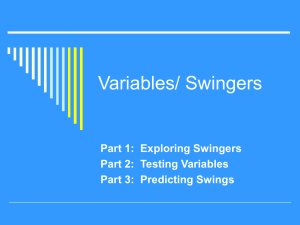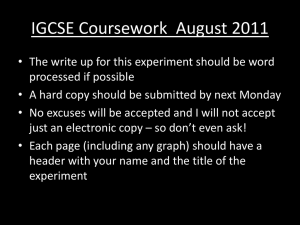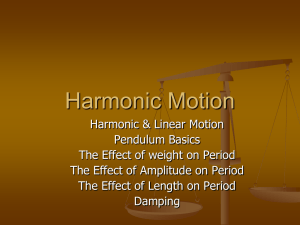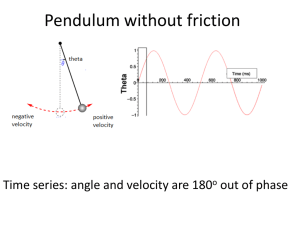Pendulum
advertisement
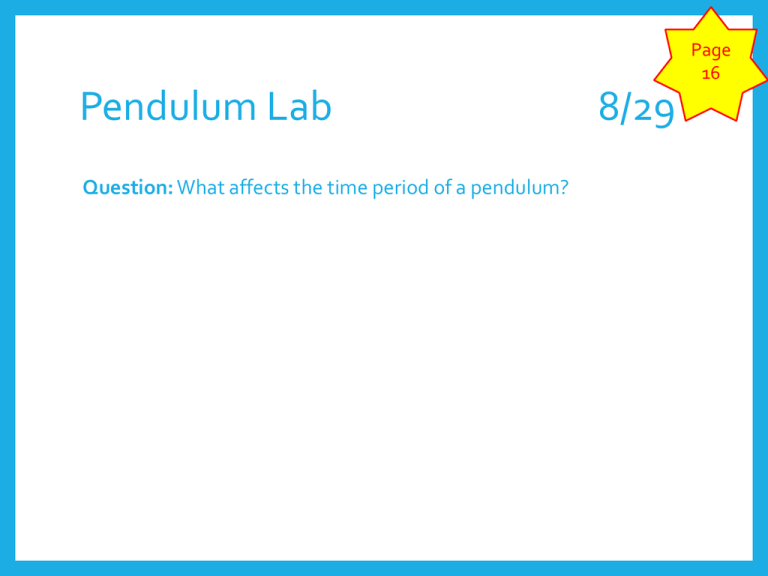
Page 16 Pendulum Lab Question: What affects the time period of a pendulum? 8/29 Page 16 Pendulum Lab 8/29 Question: What affects the time period of a pendulum? Notes: • Pendulum is an object connected to a fix support in such a way that it is free to swing back and forth under the influence of gravity. • Time Period is an amount of time. • Time Period of a Pendulum is an amount of time an object requires to make one complete swing. Pendulum Lab 8/29 Brainstorm with Your Team What can you change about a pendulum that may have a possible effect on the time period of a pendulum. Pendulum Lab 8/29 Distance Distance Length of the Pendulum Weight Length of the Pendulum Weight Page 16 Pendulum Lab 8/29 Question: What affects the time period of a pendulum? Notes: • Pendulum is an object connected to a fix support in such a way that it is free to swing back and forth under the influence of gravity. • Time Period is an amount of time. • Time Period of a Pendulum is an amount of time an object requires to make one complete swing. Hypothesis: If __________, then __________, because _________. Page 16 Pendulum Lab 8/29 Question: What affects the time period of a pendulum? Notes: • Pendulum is an object connected to a fix support in such a way that it is free to swing back and forth under the influence of gravity. • Time Period is an amount of time. • Time Period of a Pendulum is an amount of time an object requires to make one complete swing. Hypothesis: If __________, then __________, because _________. Materials: Pencil, String, Paper Clip, Weights, Meter Stick, Timer, Tape 16/18 Pendulum Lab 8/29 Variables: • Independent: Weights • Dependent: Time period Procedure: Place one weight on the pendulum. Adjust the length of the pendulum to 30 cm. Pull the pendulum back 25˚. Measure the time period the pendulum takes to complete 5 swings. Repeat a total of 5 times. Repeat using 3 and 6 weights. Page 15 Pendulum Lab 8/29 Results: Weight 1 3 6 T1 T2 T3 T4 T5 Page 16/18 Pendulum Lab Hypothesis: Variables: • Independent: Angle • Dependent: Time period Procedure: 8/29 Page 15 Pendulum Lab 8/29 Results: Angle Trial 1 (s) Trial 2 (s) Trial 3 (s) Trial 4 (s) Trial 5 (s) Average (s) 60 5.93 6.40 6.80 6.01 6.10 6.25 75 5.93 6.08 6.41 6.21 6.30 6.19 80 6.03 6.01 5.96 6.16 6.08 6.05 Page 18/20 Pendulum Lab 8/29 Hypothesis: If I (increase/decrease) the length of the pendulum, then the time period will (increase/decrease, _________), because ________. Variables: • Independent: Length of the pendulum • Dependent: Time period Procedure: Adjust the length of the pendulum to 35 cm. Put 3 weights on the pendulum. Pull the pendulum back 50 ˚. Measure the time period the pendulum takes to complete 5 swings. Repeat a total of 5 times. Repeat using lengths 45 cm and 55 cm. Page 15/17 Pendulum Lab 8/29 Results: Length Trial 1 (s) Trial 2 (s) Trial 3 (s) Trial 4 (s) Trial 5 (s) Average (s) 35 cm 6.70 6.20 6.45 6.21 6.26 6.37 45 cm 6.65 7.10 6.59 6.51 6.38 6.63 55 cm 6.06 7.30 6.15 7.45 7.60 6.91 Page 19 Pendulum Lab 8/29 Conclusion: Write a proper lab conclusion. This should be a solid PARAGRAPH and include… • What was the experiment? • What was your hypotheses? • What were the results? • What were some problems faced? • Was your hypotheses supported or nullified?


